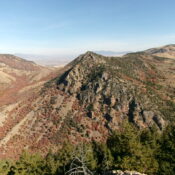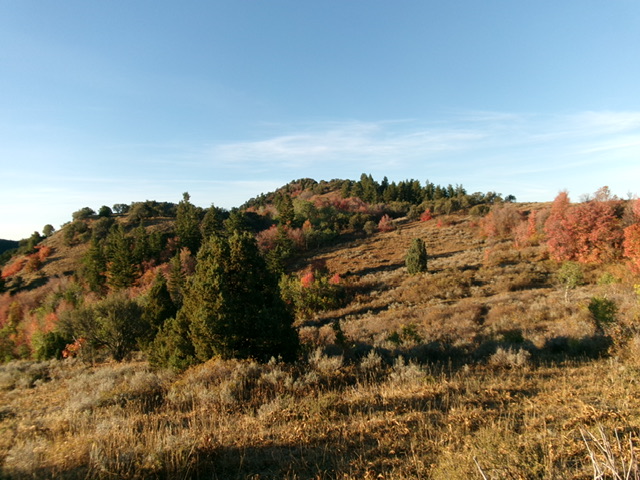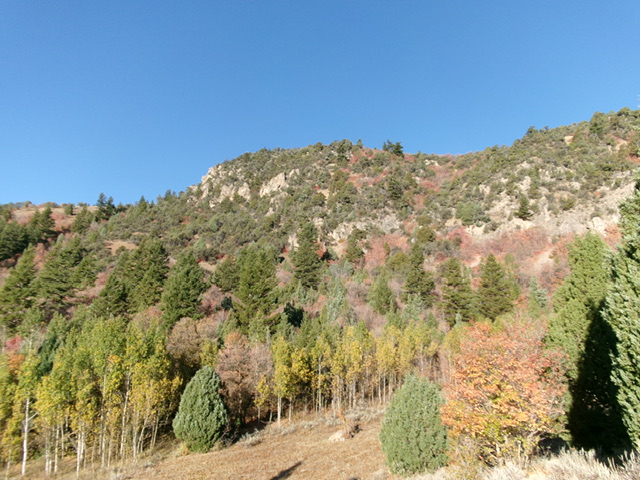Elevation: 6,940 ft
Prominence: 480

This peak is not in the book. The name was proposed by Rick Baugher. Published December 2024
Peak 6940 is a rugged, rocky peak that sits above the headwaters of New Canyon in the Bannock Range. The most feasible way to climb this peak is via its north ridge by coming up open terrain on its east side from FST-222. The south side of Peak 6940 is a stunning sight (see photo). USGS Malad Summit
Access
From Exit 17 (ID-36) on I-15, drive north on the frontage road for 2.2 miles to [signed] E5500N. This is New Canyon Road and is signed for the “New Canyon Trailhead.” Reset your odometer here. At 2.6 miles, reach the Caribou National Forest boundary. At 4.0 miles, reach the end of the road and a trailhead for FST-222 (an ATV trail). Park here (5,835 feet and 42⁰17’00”N, 112⁰08’37”W). This is the first leg of a 2-peak adventure that includes Peak 6940 and Peak 7208. It covers 6.5 miles with 2,350 feet of elevation gain round trip.
Map Errors and Other Corrections
The end of New Canyon Road (and the trailhead) is about ½ mile and 400 feet lower than the National Forest map (and Baugher) indicate. New Canyon Road/FSR-222 is a well-maintained county road to the National Forest boundary and a decent 2-track road above that point. It is not a 4WD road as maps indicate, though it has some minor rutting and a rocky patch just below the road’s end. The USGS topo map fails to show the full extent of FST-420. This ATV trail continues south up over a ridge crest (and beyond), well beyond the pond at 6,400 feet. This trail is very useful in getting close to Peak 7208.
North Ridge, Class 2
The Climb
From the trailhead, hike about ½ mile east then northeast up loose, rocky FST-222 (an ATV trail). Leave the trail after it reaches open terrain on its left/northwest side. Scramble northwest then north-northwest in open grass and sagebrush on the right edge of a pine forest in a dry gully. Use a cattle trail to assist in this section of the climb. Higher up, the gully narrows and becomes more pronounced.
Continue up the steepening gully as it bends left/west to reach the crest of the open north ridge. Follow the easy, semi-forested north ridge over a hump (or skirt its left/east side) to reach a ridge saddle. From the saddle, head south up the easy, mostly-open north ridge to the summit of Peak 6940. The summit has a modest cairn.

Looking at the summit hump from high on the north ridge. This was the final leg of my ascent route. Livingston Douglas Photo
East Face, Class 3
The Descent
From the summit, descend north back to the high saddle at 6880+. Leave the north ridge and bushwhack east down a dry gully that leads down the east face. This gully becomes very thick with brush and maples. It has cliff bands hidden in it and becomes rough and steep. After a rough bushwhack in thick, steep forest with hidden boulders and cliff bands (Class 3 downclimbing), emerge into open, easy grass and scrub. Continue heading eastward. Cross a shoulder and descend right-ish/southeast to the signed junction of FST-222 and FST-420. Both trails are good ATV trails and are shown on maps. This low point concludes the first leg of today’s 2-peak journey. Peak 7208 is up next.

Peak 6940 (dead center) and its rugged east face. This was my descent route. Livingston Douglas Photo
Additional Resources
Regions: Bannock Range->SOUTHERN IDAHO
Mountain Range: Bannock Range
First Ascent Information:
- Other First Ascent: East Face—Descent
- Year: 2024
- Season: Summer
- Party: Livingston Douglas
Longitude: -112.1433 Latitude: 42.2881
